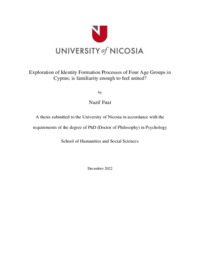- Fuat, Nazif
- Department of Social Sciences
- 2022
- English
- 222 pages
- Anastasiou, Andreas | Constantinou, Marios | Adonis, Marios
- Cyprus | Collective Self-Esteem | Identity | Familiarity | Contact | Social Distance
- Social Science
-
-
Developmental identity theorist James Marcia (1966) emphasizes the importance of experiencing a psychological “crisis” which would lead a person to a healthy exploration before attaching the self to an identity. In relating this theory to the development of the identity of the two communities in Cyprus, one could question whether the individual members of each group went through such a “crisis” which is essential if we are to achieve the formation of a healthy identity. Cyprus, as an island, has experienced several conflicts and wars in its long history. The incidents Cyprus has experienced are believed to have had important impacts on the residents’ identity development, self-definition and ultimately, their collective self-esteem. Stemming from this, the primary purpose of this study was to ascertain the differences between four age groups on their collective self-esteem, and identity definitions. The participants consisted of 596 Cypriots; 291 (48.8 %) of the participants were from the Greek Cypriot community, while 305 (51.2 %) of them were from the Turkish Cypriot community. For the purpose of the study, Collective Self-Esteem Scale (CSES), Contact Scale (CS) and Social Distance Scale (SDS) were used for data collection. Due to the distribution of data, the collected quantitative data was statistically analyzed through nonparametric tests. The analysis of the data has mainly been done through Kruskal-Wallis H, MannWhitney U and Chi-square tests. The results point to a significant difference (p≤0.05) between the participants’ age groups and both general scores from Collective Self-esteem scale and the scores from Identity subscale as well as their familiarity levels, contact levels and social distance levels which showed that conflict and war experienced on the island had impact differently on different age groups.
-
Exploration of Identity Formation Processes of Four Age Groups in Cyprus; is familiarity enough to feel united?
Main Files
 Full text
Full text
Description: NAZIF FUAT PHD THESIS DECEMBER 2022 FINAL SUBMISSION.pdf (pdf) Book Reader
Size: 2.1 MB
| Type | Location | Link |
|---|---|---|
| dissertation | [More information] |

